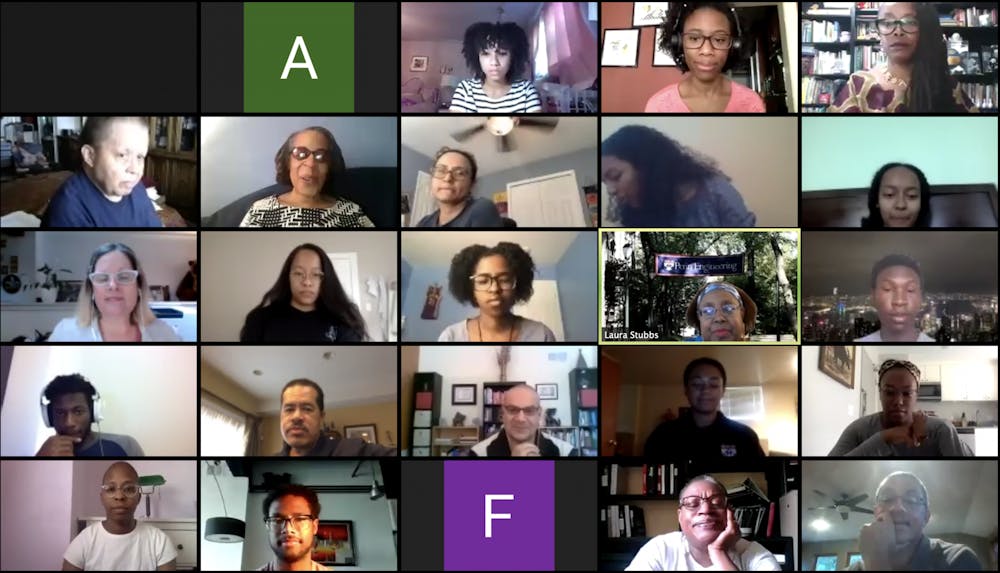Thirty percent of Black alumni in the Engineering School were told at least once to consider academic leave or to disenroll from Penn, according to a virtual presentation by students and alumni to Penn Engineering deans this week.
At a virtual discussion on July 14, Penn's chapter of the National Society of Black Engineers led a dialogue with Engineering Dean Vijay Kumar and newly appointed Engineering Associate Dean of Diversity, Equity, and Inclusion Camillo Jose Taylor to discuss the experiences of Black engineers at Penn.
NBSE members listed four requests to Kumar and Taylor, calling for change within Penn Engineering to increase support for the Office of Diversity and Inclusion, Black student engagement with faculty, support for Black engineers, and outreach opportunities in West Philadelphia.
During the discussion, current students and recent alumni shared personal anecdotes and statistics from a survey of Black Engineering alumni from 2013-2019, which pointed to discriminatory treatment on the basis of race.
Penn NSBE member and 2016 Engineering graduate Elaida Dimwamwa presented a number of statistics from the alumni survey. Fifty-five percent of Black Penn Engineering alumni felt excluded from their engineering department, 70% of Black Penn Engineering students felt professors gave up on them too easily, and 45% of Black Penn Engineering students were discouraged from pursuing their post-graduation goals by University faculty, according to the survey.
July's virtual discussion had over 120 attendees, which included Penn NSBE members, Penn NSBE alumni, Kumar, Taylor, and others who solely came to listen.
"Racism is rampant throughout the entire institution including SEAS,” one anecdote from the presentation read. “From being asked to show ID when other students weren't asked the same, to being told my post-graduate plans weren't possible, to being seen as a food server at multiple scholarship events, it was evident that Penn was not a place for me to thrive."
Alumni from the last 60 years also shared stories of their own experiences with the group, recalling times people placed in positions of power by the University had discouraged them from reaching their full potential, stating they were “reaching too high.”
RELATED:
Penn Engineering names Camillo Jose Taylor first-ever dean for diversity, equity, inclusion
Penn prof. faces backlash after disagreeing with National Book Critics Circle BLM statement
"I feel like this sums up the experience of many Black students in Penn Engineering — always feeling like we needed to prove ourselves because we were expected to fail,” another anecdote from the presentation read.
Today, students are still having similar experiences.
“So much of the discrimination I felt was so passively harmful. Just the little things, you know, not getting called on in class, or people second-guessing your understanding of fundamental concepts, or having lab partners ignoring you when you're trying to get your input,” rising College senior and Penn NSBE Program Chair Maya Robnett said.
Rising Engineering senior and NSBE secretary Toni-Ann Peck said she often feels unable to talk about her experiences within the Engineering School.
“There are times in which I feel I have to be reserved, because otherwise I won't be well received in later encounters,” Peck said.
Rising Engineering senior and Penn NSBE President Ruby Washington said NSBE organized the discussion in response to an unwelcoming environment for Black students within Penn Engineering.
“Black Engineers feel excluded in the current space,” Washington said. “We feel overlooked and forgotten in this space, where diverse students should be embraced and uplifted.”
Rising Engineering junior and Penn NSBE treasurer Maerone Alfa added that the discussion with Engineering faculty was organized because students felt that a panel Kumar hosted last month to discuss racism, bias, and climate was too controlled and did not give students a voice.
“It was more so just sending the message that Penn engineering is doing enough,” rising Engineering junior and NSBE Vice President Theresa Tsaggaris said.
At the end of the meeting, Penn NSBE, Kumar, and Taylor decided to meet again next month to continue the discussion on how to enact tangible change for Black engineers at the University.
“It was unfortunate to hear the extent to which you know some of these experiences persisted today,” Taylor said. “But one of the heartening things is that I think that many of the things that were discussed in that meeting were ideas that we were also thinking of.”









